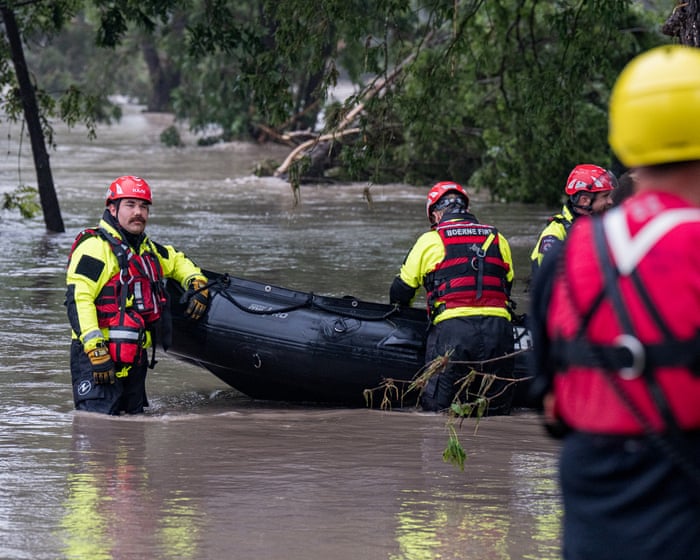Experts say a new Trump administration report, which aims to justify rolling back environmental regulations, is filled with climate misinformation.
On Tuesday, the Environmental Protection Agency (EPA) proposed overturning the 2009 “endangerment finding,” a rule that allows the agency to regulate greenhouse gas emissions from vehicles, power plants, and other industrial sources. Shortly after, the Department of Energy (DOE) released a 150-page report supporting the move, arguing that concerns about the climate crisis are exaggerated.
“Climate change is a challenge—not a catastrophe,” wrote Energy Secretary Chris Wright in the report’s introduction.
Renowned climate scientist Michael Mann compared the report to something “you’d get if you trained a chatbot on the top 10 fossil fuel industry-funded climate denial websites.”
The DOE’s report followed the EPA’s announcement to scrap the 2009 ruling, which serves as the legal foundation for regulating climate pollution under the Clean Air Act. If finalized, this move could dismantle nearly all U.S. climate regulations.
In a Fox News interview, Wright claimed the report countered what he called “cancel culture Orwellian squelching of science.” But Harvard professor Naomi Oreskes, an expert on climate misinformation, said its real purpose was to “justify a scientifically unjustifiable failure to regulate fossil fuels.”
“Science is the basis for climate regulation, and now they’re trying to replace real science with pseudoscience,” she said.
### A Push for Fossil Fuels
The attack on the endangerment finding—which states that greenhouse gases threaten public health—aligns with Trump’s pro-fossil fuel agenda, despite their role in driving global warming.
“This is about promoting fossil fuels, not protecting public health or the environment,” said Rachel Cleetus of the Union of Concerned Scientists, who contributed to the latest U.S. climate assessment.
When asked about scientists’ claims that the report spreads misinformation, DOE spokesperson Ben Dietderich said it “critically assesses areas of scientific inquiry often given high confidence by political bodies like the U.N. or past administrations—not necessarily by scientists themselves.”
However, the U.N.’s Intergovernmental Panel on Climate Change (IPCC) is widely regarded as the gold standard for climate science. Its reports involve hundreds of scientists worldwide, undergo rigorous peer review, and are approved by governments. The most recent IPCC report, released two years ago, concluded it is “unequivocal” that human activity has warmed the planet, causing widespread harm to people and nature.
In contrast, the Trump administration’s report was written by five handpicked scientists with fringe views, without peer review. The authors have denied being climate deniers, but the DOE did not respond to questions about their selection.
“This report had five authors, was rushed in four months, and wouldn’t pass any credible scientific review,” said Zeke Hausfather of Berkeley Earth, calling it a “farce.”Energy Secretary Wright maintained that he had not influenced the report’s conclusions, while Judith Curry, one of its authors, stated in a blog post that she hoped the document would shift climate science “away from alarmism and advocacy.”
However, mainstream climate scientists criticized the findings as misleading and inaccurate. Natalie Mahowald, a climate scientist at Cornell University, said, “This report was written by a few scientists whose views on climate change are outliers. It doesn’t undermine previous assessments—it just cherry-picks studies to create a false impression of a new review.”
Mahowald noted that the lack of peer review made the report far less credible than the IPCC’s assessments or the U.S. government’s National Climate Assessment, which the Trump administration had recently removed from public access. The latest National Climate Assessment, produced in 2023 by multiple government agencies and independent scientists, concluded that human-caused climate change is already having severe and worsening effects across the U.S.
Andrew Dessler, a climate researcher at Texas A&M University, remarked, “If almost any other group of scientists had written this report, it would have looked completely different. The only way to get these conclusions was to handpick these authors.”
Zeke Hausfather, another climate scientist, agreed that the authors’ work reflected their personal views rather than the broader scientific consensus. He pointed out that the report misrepresented his own research—citing a chart from his 2019 study to claim that climate models overestimated carbon levels, when in fact his paper showed that models had performed well.
“They ignored the full study because it didn’t fit their narrative,” Hausfather said. “Instead, they took one figure from the supplementary materials to cast doubt on models, even though the research confirmed their accuracy.” The Energy Department did not respond to his concerns.
Hausfather, who also leads climate research at Stripe, said the report consistently cherry-picked data while ignoring the vast majority of scientific literature. Dessler added that scientists must consider all evidence, even when it challenges their assumptions, and that ignoring this principle could amount to “scientific misconduct.”
Dessler likened the report to a legal defense for carbon dioxide, saying, “Their goal isn’t to weigh the evidence fairly—it’s to make the strongest case for CO2’s innocence.”
The report’s lack of peer review led to conclusions that often contradicted established science. Many of its claims relied on long-discredited arguments pushed by climate change skeptics, according to Michael Mann.
“It’s the same old debunked talking points, repackaged to look like new insights,” Mann said. “The only difference is that now they carry the EPA and federal government’s stamp.”
For example, the report downplays warming trends despite overwhelming evidence to the contrary—published just as extreme heat waves were affecting millions of Americans.
“They’re literally telling us not to believe what we see with our own eyes,” Mann said, “and instead accept their denialist framing, which rejects not just the science, but reality itself.””You can clearly see the evidence just by looking out your window,” said Mann.
The authors also claim that ocean acidification falls “within natural variability” and actually benefits marine life, even though current acidity levels are the highest they’ve been in 14 million years—a period marked by a major extinction event.
Meanwhile, National Science Foundation staff have criticized Trump’s proposed budget cuts as “politically motivated.”
The report also points to Australia’s Great Barrier Reef as an example of resilience, stating it has “shown significant growth in recent years.” However, the reef has recently suffered its sixth mass bleaching event since 2016—a devastating process where corals turn white and often die due to high ocean temperatures. Before 1998, no widespread bleaching events had been recorded.
Bob Kopp, a climate scientist at Rutgers University, called the report “tedious” and at times “truly wearisome.” Kopp recently co-authored a study showing how rising temperatures and drought will harm crop yields, contradicting the report’s claim that increased carbon dioxide will boost agricultural productivity.
“Carbon dioxide fertilization doesn’t change the fact that extreme heat and severe drought will devastate crop yields,” Kopp said. “As a former Department of Energy fellow, I find this report embarrassing.”



